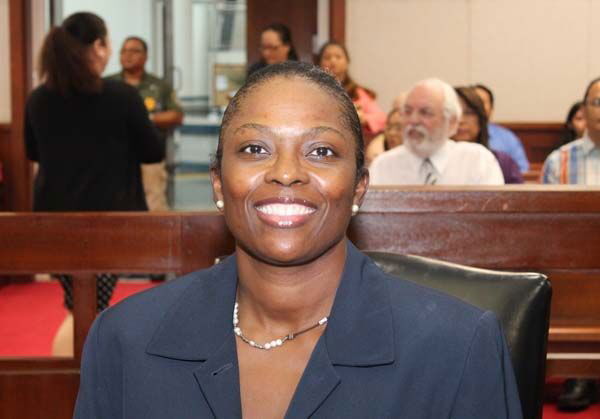
Shelli Neal
THE Superior Court has granted the request of attorney Shelli Neal to dismiss the disciplinary complaint filed against her by the NMI Bar Association.
In a 16-page order on April 14, Judge Joseph N. Camacho said “the CNMI Bar Association Disciplinary Committee [members] are not duly elected members, therefore the disciplinary committee members lack authority to investigate or act on disciplinary complaints.”
The complaint accused Neal of misconduct and lack of due diligence in her representation of Qihao “Henry” Liang in a civil action.
A former CNMI chief prosecutor, Neal represented Liang in 2017 in Superior Court Civil Action 17-0142.
The complaint stated that Liang appointed her to receive on his behalf a $500 monthly rental payment for a property he owned. He likewise retained Neal to conduct a real estate lease transaction for him sometime in 2017, involving a piece of property in Dandan worth $183,000.
On Dec. 6, 2022, Liang filed a complaint with the CNMI Bar Association’s Disciplinary Committee.
“Notwithstanding receiving notice from the NMI Disciplinary Committee regarding Mr. Liang’s complaints against her, Ms. Neal did not make any effort to cure the obvious lack of communication to Mr. Liang regarding his real estate tax nor did she make any effort to provide him with an accounting as he had requested from her multiple times,” the complaint stated.
In its complaint, the Bar Association asked the court to discipline Neal, and to order her to provide her former client, Qihao “Henry” Liang, with any and all accounting applicable to their attorney-client relationship, and pay all funds owed to Liang derived from the rental monies received by Neal on his behalf.
The bar appointed Jose Mafnas Jr. as prosecuting attorney.
Mafnas said Neal should serve a 90-day interim suspension, “subject to extensions, until the matter is adjudicated, and discipline is administered.”
Neal, represented by Michael Dotts, asked the court to dismiss the complaint.
Dotts said the “Disciplinary Committee investigated the matter and voted to refer it for prosecution. However, the…Committee lacked the capacity to do so.”
“The Bar Disciplinary Committee members must be elected by a majority vote of active members of the Bar Association,” he added.
According to Dotts, the active members of the bar numbered 166 in 2022 and 154 in 2023.
“This means that the two positions open in 2022 needed 84 votes each, and the three positions open in 2023 need 78 votes each from the active members to fill them. No member received more than 13 votes in 2022 or 17 votes in 2023. No member elected to the Disciplinary Committee in either of these two years was properly seated on the Committee,” Dotts said.
Neal’s motion to dismiss stated:
“The review of a complaint by a properly constituted Disciplinary Committee is part of the due process an attorney is entitled to.
“The Committee is analogous to a Grand Jury. If a Grand Jury is not properly seated, any indictment it issues is invalid. Likewise, the referral issued by the improperly seated CNMI Disciplinary Committee against Neal was invalid. Because the referral was invalid, this court lacks subject matter jurisdiction and this case must be dismissed.”
In addition, Dotts said his client “was not provided adequate time by the Disciplinary Committee to respond to the allegations and this was a separate violation of the Rules of Attorney Discipline and Procedure that also justifies dismissal.”
Judge Camacho, in his order, noted that the case is about the election of Disciplinary Committee members, adding that both active members and temporary members are eligible to vote.
“There is nothing defective or ambiguous about Rule 7(a)(2) requiring Disciplinary Committee members be elected by a majority of the full number of active members of the CNMI Bar Association. The CNMI Bar Association simply failed to follow Rule 7(a)(2) in conducting the 2022 and 2023 Disciplinary Committee elections,” the judge said.
The current Rule 7(a)(2) requires a mandatory majority vote of active members, he added.
“Here, the result is that more than one-half of the CNMI Bar Association must vote affirmatively to elect a candidate to the Disciplinary Committee. In 2022 to garner a majority of the vote of all the active members, a Disciplinary Committee candidate must receive an affirmative vote of 84 or more votes. In 2023, to garner a majority of vote of all active members, a Disciplinary Committee candidate must receive an affirmative vote of 78 or more votes,” the judge said.
When the Disciplinary Committee members were elected, there were 166 active members of the CNMI Bar in 2022, and 154 active members of the CNMI Bar in 2023, he added.
According to the judge, “Fewer than one-half of the total active membership of the CNMI Bar Association voted for the Disciplinary Committee members in those elections. Most of the active members of the CNMI Bar Association did not cast ballots, creating a majority of undervotes. Undervotes are valid votes; thus, basically, the vast majority of CNMI Bar Association members voted against the candidates on the ballots.”
“Setting aside bruised egos and hurt pride,” the judge said, “the 2022 and 2023 elections of Disciplinary Committee members were pursuant to Rule 7(a)(2) of the NMI Rules of Attorney Discipline and Procedure, and all the candidates were rejected by the voters.”











